|
A Bond is a Bond is a
Bond
Thoughts on the 70th Anniversary Editions of the original James Bond
novels
by
John Cork
Years ago, Dr. Seuss Enterprises decided that six of the author’s
books should no longer be published. “These books portray people in ways
that are hurtful and wrong,” the organization said in a statement. This
was news to the millions who had read these books as kids and had never
seen any evidence that Dr. Seuss had ever portrayed anything in a
hurtful way. “Ceasing sales of these books is only part of our commitment
and our broader plan,” the statement said.
For me and millions of others, a chill ran down our spines. Nothing good
can come from a sentence that begins “Ceasing the sales of these books…”
Now comes word that the James Bond novels are being altered to some degree
to adapt the language to more modern sensibilities. Is this censorship? Is
this another example of “woke culture” run amok? |
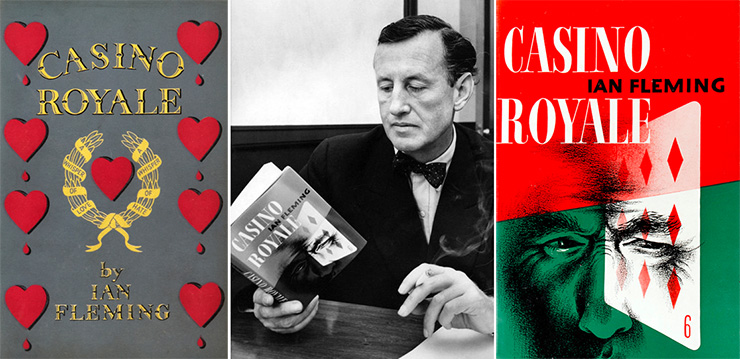 |
|
Too often in our modern
world we encounter those eager to tell us everything they see as wrong.
Sure, an objective reader would agree that attitudes expressed in the Bond
novels are often racist, sexist, and homophobic. Does that mean anyone who
enjoyed those novels must be polluted with those biases? I don’t think so.
For example, James Bond sleeps with a gun under his pillow in CASINO
ROYALE (1953). As an American who has read the novels numerous times, I
don’t own a gun. Nor do I own Bond’s attitudes, prejudices, or biases.
Heck, I can tell you how to make a Vesper martini, but personally, I don’t
drink.
When it comes to the Bond novels I try to hold to an old dictum: pick the
flowers, not the weeds.
I can love what I love, and set aside the rest as fascinating
archaeological evidence of the era in which Fleming wrote. Yet, as the
years slip past, the burden of being a fan of Fleming’s writing has grown.
What do we do with the passages that seemed so fresh and edgy in the 50s
and 60s, but now seem at best clunky and, for many, casually and cruelly
offensive?
The Bond novels could be allowed to slip out of print. Maybe Ian
Fleming Publications could issue a self-congratulatory statement along
the lines of Dr. Seuss Enterprises. Or they could pretend times
have not changed hoping that no ‘Twitter Social Justice Warrior’ decides
to start a campaign to cancel the works of Ian Fleming.
Or the Fleming family members who control the publishing rights could take
a more difficult path and try to gently adapt the books in some way to
make them accessible to modern readers.
Is this some level of absurd self-censorship? Is Ian Fleming spinning in
his grave?
I don’t think so, and I believe I have the receipts to prove my point.
|
 |
|
In 2017 I was asked to
write introductions to three Bond
novels for hardback editions published by Vintage Classics in
the UK; the titles CASINO ROYALE, LIVE AND LET DIE, and GOLDFINGER. I
immediately reached out to Penguin and Ian Fleming Publications
with a note on May 9, 2017, which included the following:
“I presume the plan is to use the British text from the first edition.
But I am ever hopeful that the American edit might be used. The reason I
bring this up is that when Al Hart edited the book for America, he worked
with Fleming to correct numerous factual errors and to work around some of
the more offensive passages.”
Ten days later, Ian Fleming Publications and Penguin agreed
that they should review every edit made for the US publication of LIVE
AND LET DIE in April 1955. Fortunately, Bond scholar Bryan Krofchok
compiled a meticulous list years earlier that was published in issue #4 of
Goldeneye Magazine, which I edited during its brief life in the
1990s. Krofchok’s work provided the basis for creating the edition
published by Vintage, which, aside from a few small passages that
were retained from the British edition, mirrors the US edition.
The statement from Ian Fleming Publications addressing the 2017
edition of LIVE AND LET DIE is correct: Ian Fleming approved every edit
that Al Hart made to that text.
There was no alternate US edition of GOLDFINGER, which contains passages
that are decidedly racist towards Koreans. “They are the cruelest, most
ruthless people in the world,” Auric Goldfinger exclaims.
Bond himself joins in later when Fleming writes, “Bond intended to stay
alive on his own terms. Those terms included putting Oddjob and any other
Korean firmly in his place, which, in Bond's estimation, was rather lower
than apes in the mammalian hierarchy.” |
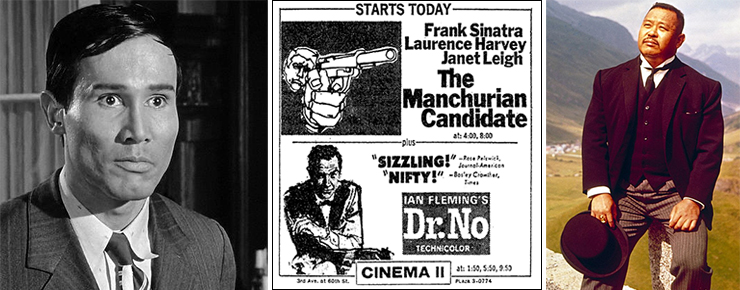 |
|
ABOVE: (left)
American character actor Henry Silva (1926-2022) as Korean manservant Chunjin in The Manchurian Candidate (1962). (centre) John
Frankenheimer's masterful film adaptation of Richard Condon's classic
1959 political thriller was later paired on a double-bill
with the first James Bond film Dr. No (1962),
for a New York revival in early 1964. (right) Hawaiian-born American
1948 Olympic Silver medal-winning
weightlifter, professional wrestler, and film actor Harold Sakata
(1920-1982) as Korean manservant Oddjob in Goldfinger (1964). |
|
|
|
No editor objected to
this overt racism. In explanation (but not defense), Fleming wrote these
passages when there was still great resentment in the UK to the actions
against British soldiers by Korean guards working for the Japanese in
Prisoner Of War camps during the Second World War. In the US, reports of
the tortures inflicted by Koreans during the Korean War, and sights of
brutal inhumanity during that conflict were still fresh in the minds of
military veterans. The view of Koreans as animalistic and cruel was so
prominent at the time that, as I noted in my 2017 introduction, GOLDFINGER
was not the only novel released in 1959 with a villainous Korean
manservant: The Manchurian Candidate featured Chunjin, a
cold-hearted former US Army interpreter.
But who among average readers is going to have this context at their
fingertips?
I have no idea if these passages have been altered in the 70th Anniversary
editions, nor if there is anything addressing Bond’s screed about how
giving women the right to vote somehow led to sexual confusion and the
spread of homosexuality.
No reviews from 1959 that I’ve read of GOLDFINGER ever mentions these
passages. This means Fleming was successfully reflecting the biases and
blind spots of the world in which he lived. How successfully? Fleming’s
editor at Jonathan Cape was William Plomer, a good friend of Ian’s. Ian
dedicated the novel GOLDFINGER to Plomer. In the notes Plomer sent Ian on
GOLDFINGER, he made no mention of Bond’s rant about homosexuality. I feel
confident that had Plomer asked Fleming to tone the passage down or remove
it, Fleming would have. Plomer, after all, had brought Fleming’s original
typescript of CASINO ROYALE into Jonathan Cape, his recommendation
securing Fleming a publishing deal. Plomer had every motivation to look at
the passage with careful consideration because, of course, Plomer was gay.
Fleming had numerous gay friends: Noel Coward, W. Somerset Maugham are two
obvious examples. Yet, at the time, the literary convention concerning
homosexual characters involved a denouncement of just the sort that
Fleming included in GOLDFINGER.
Is it wrong now that there be a version of the novel published that
considers what Plomer might have said to Fleming had he not lived in an
era where homosexual behaviour was criminalized? An era where if Plomer
was arrested for homosexual activity he would face jail or chemical
castration? |
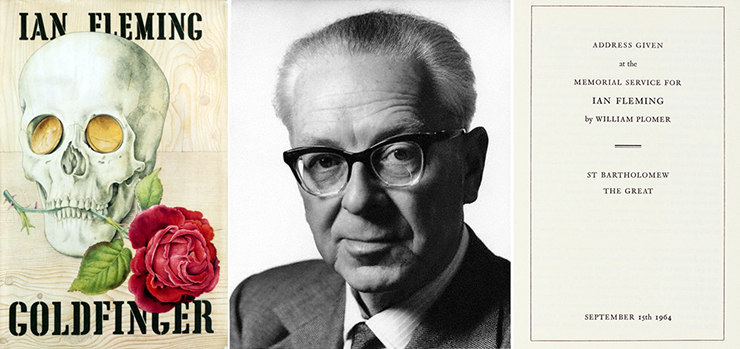 |
|
ABOVE: (left) The dust jacket for the Jonathan Cape
hardback edition of GOLDFINGER (1959) illustrated by Richard
Chopping (1917-2008). (centre) GOLDFINGER was dedicated to Ian
Fleming's friend the South African born novelist, poet and
literary editor William Plomer (1903-1973), who would later write
the address for Ian Fleming's memorial service (right) held at St.
Bartholomew The Great in London on September 15, 1964.
|
|
|
|
Maybe one believes
the thoughts Fleming attributed to James Bond are so integral to the
core of the novel that altering them would destroy any integrity in
Fleming’s writing. Fleming certainly didn’t see things that way.
For example, when the novel GOLDFINGER was published in the July 1964
issue of SAGA magazine, Ian Fleming was still alive. And, yes,
Auric Goldfinger’s assessment of Koreans is still in the text. Bond’s
offensive views are not. And Bond’s mental rant about “pansies of both
sexes being everywhere” is nowhere to be found.
Heavy edits were made to the Daily Express serializations of
the Bond novels during Fleming’s lifetime, as well as to the US
King Features Syndicate 1962 serialization of THUNDERBALL in
newspapers (see Daily Leader ad below).
PLAYBOY made major
edits to the Bond novels they published during Fleming’s lifetime.
Fleming himself had to approve each one of these publications of his
work. This means he either read the edits and approved, or he simply
trusted the editors to make wise choices for their markets.
It is hard for me to believe that Ian Fleming would not tacitly
approve of the concept of updating some language and omitting certain
portions of the novels, since he participated in this during his
lifetime.
These editions are not even close to the first time the novels have
been altered since Fleming’s passing. |
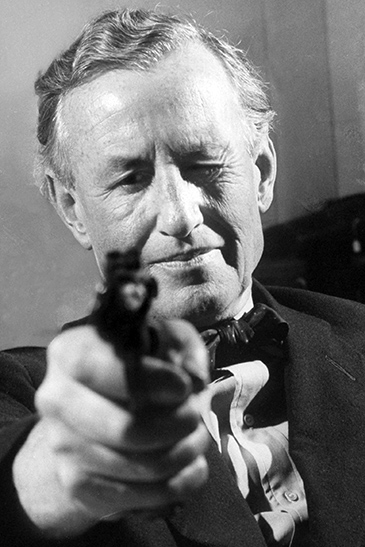 |
If you want to read some
seriously sanitized versions of the Bond novels, seek out the ‘adapted’
editions for early readers. Oxford University Press published two
separate editions of MOONRAKER, one for adults learning to read English,
and another for younger readers. There are
Bulls-eye
young reader editions of many of the titles from the mid-1970s adapted
by Patrick Nobes. |
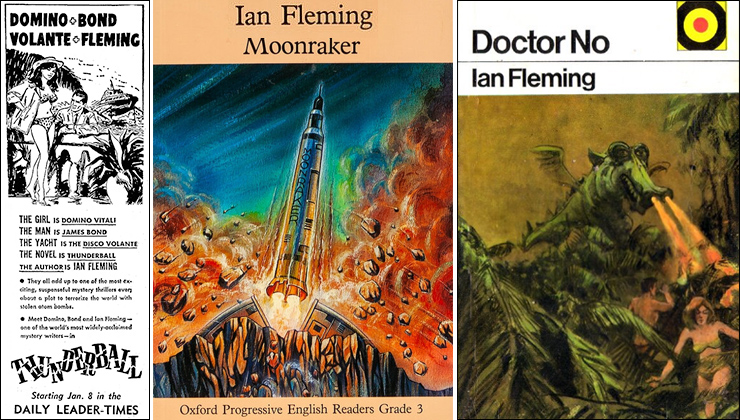 |
|
One can also find old,
abridged audiobook editions of the Bond novels, all released without fuss.
When I think of all the different editions and lives of the Bond novels, I
think also about a novel Ian Fleming quite loved: All Night At Mr.
Stanyhurst’s, first published in 1933. In 1963, Fleming’s publisher,
Jonathan Cape, reprinted the novel with a new introduction by James Bond’s
creator. The book still did not catch on. For the past 60 years, it has,
to my knowledge not been reprinted. “How often are books raised from the
dead…?” Fleming quotes from a Times Literary Supplement article in
his introduction. Not often, is the brutal answer. Most novels disappear
without a ripple. Some books, like the six Dr. Seuss titles
retired, are memory-holed on purpose. Others seem to become strange relics
of the past.
Then there are the James Bond novels, which barely seemed dated when I
first read them in the mid-1970s, and now seem like fascinating (and
exciting) cultural artifacts of the Cold War. Will these novels survive?
Only if we let them. Only if we are not so precious about them in ways Ian
Fleming never was. Would it be wrong to re-publish the SAGA magazine
version of GOLDFINGER? It was the last re-edit of the novel published in
Fleming’s lifetime.
The Holy Bible appears in not only The King James edition,
but the New American Standard, the Revised English Bible,
the New English Bible, the New International Version, the
New Standard Version, the New Living Translation, the
Tyndale Bible, the Revised English Bible, and the New King
James Version – to name a few. Each edition alters the language, and
for some, the meaning. Older editions that referred to “men” and “man”
have been replaced by newer translations that use language that includes
women. “No one can serve two masters” replaces the King James “No
man can serve two masters,” for example. I don’t think these revisions
were undertaken to accommodate snowflakes. |
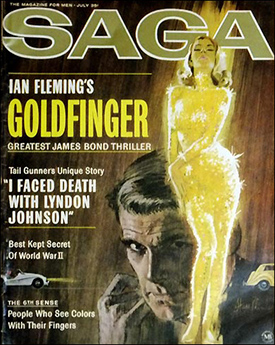 |
The Bond novels
continue to exist in their original form. There are hundreds of
thousands of English-language copies of each of the Ian Fleming Bond
titles available, versions that reflect both the original UK text and
the versions separately edited for the US printings. Those editions
are not going anywhere, and if there is strong demand for the original
text, Ian Fleming Publications would almost certainly print new
versions that adhere to it.
Are these edits a good idea? Will the public embrace them? Would
anyone have noticed if not for the current fascination with culture
wars? This type of revision happened many years ago with Hugh
Lofting’s Doctor Doolittle books. No one seemed to care. Roald
Dahl revised Charlie and the Chocolate Factory after some
pointed out the offensive descriptions of the Oompa Loompas.
For me, these are just another edition of the Bond novels, another
chapter in the strange and captivating history of the 007 literary
phenomenon. I’m interested in reading the minor textural changes,
seeing what the editors chose to revise.
|
|
|
John Cork is the co-author of three official books on the Bond phenomenon,
a writer, producer, and director for many of the special features found on
the James Bond Home Entertainment releases through 2006’s Casino Royale.
Cork is currently developing a podcast looking at how the original James
Bond novels interact with history. |


